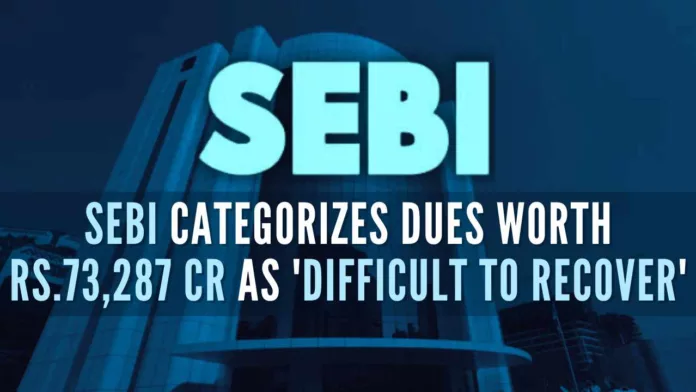
Here’s what SEBI’s annual report for 2022-23 says about dues
India’s stock exchanges regulator SEBI has segregated dues to the tune of Rs.73,287 crore under the “difficult to recover” category at the end of March 2023. Overall, the markets watchdog has dues worth Rs.1.02 lakh crore that needs to be recovered from entities, including those that failed to pay the fine imposed on them, or were unable to pay fees due to it and did not comply with its direction to refund investors’ money, according to Securities and Exchange Board of India’s (SEBI) annual report for 2022-23, which was released on Monday.
Of Rs.1.02 lakh crore, Rs.63,206 crore, which is 62 percent of the total amount, pertains to the collective investment scheme and deemed public issues of PACL Ltd and Sahara Group company, Sahara India Commercial Corporation Ltd. Further, the regulator said parallel proceedings are pending before various courts and court-appointed committees in 77 cases involving Rs.70,482.62 crore, or 69 percent of the total amount.
“In these cases, SEBI’s recovery proceedings are subject to directions/ approvals of respective court/ committee. Matters where Insolvency and Bankruptcy Code (IBC) is invoked, SEBI’s recovery proceedings are affected by the moratorium under the said code,” the regulator said. Going by the annual report, the capital markets watchdog has categorized dues worth Rs.73,287 crore as difficult to recover (DTR) as on March 31, 2023. DTR dues are those that could not be recovered even after exhausting all modes of recovery.
It clarified that segregation of such DTR dues is purely an administrative act and this will not preclude recovery officers from recovering the amount so segregated as DTR as and when there is a change in any of its parameters. The SEBI is empowered to recover penalties imposed by the adjudicating officer. The markets watchdog took up 144 new cases, pertaining to flouting securities law, for investigation during 2022-23, which is way higher than 59 cases taken up in the preceding financial year.
The cases were related to violation of securities law, including market manipulation, price rigging, and insider trading. “During 2022-23, 144 cases pertaining to various violations of securities laws were taken up for investigation and 152 cases were completed,” SEBI said. Of these, 85 cases taken up for investigation were related to market insider trading, 54 for market manipulation and price rigging, and the remaining five for violations of securities law.
SEBI initiates investigation based on references received from sources such as its integrated surveillance department, other operational departments, and external government agencies. During 2022-23, the regulator initiated enforcement action in 67 cases, while it disposed of 333 cases.
PGurus is now on Telegram. Click here to join our channel and stay updated with all the latest news and views
For all the latest updates, download PGurus App.
- Supreme Court rejects plea to tally all VVPAT slips with EVM votes; says ‘no going back to paper ballot’ - April 26, 2024
- US report citing human rights violations is deeply biased: India - April 25, 2024
- Kotak Mahindra Bank shares tank 13%. Market Cap erodes by Rs.37,721 cr post-RBI action - April 25, 2024










